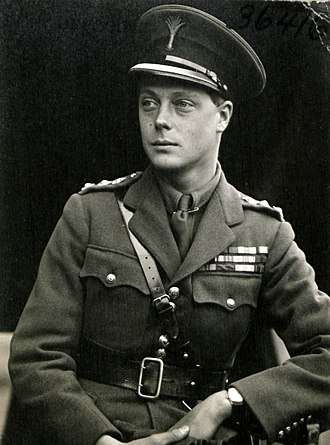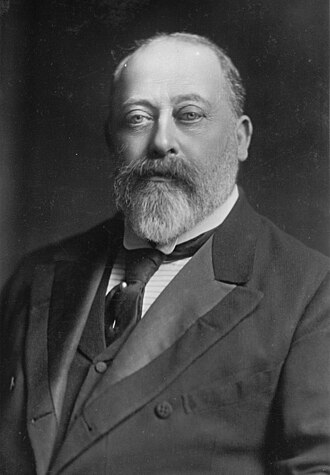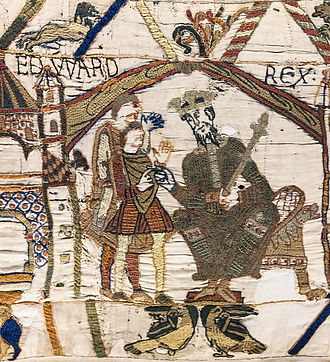Discover Your Roots
SIGN UPDiscover Your Roots
SIGN UPEdward is a male name of English origin, meaning "Wealthy Guardian." Derived from the Anglo-Saxon name Ēadweard, it combines the elements ēad, signifying "wealth, fortunate, prosperous," and weard, meaning "guardian, protector." The name was popular in Anglo-Saxon England but declined in use among the upper classes during the rule of the Norman and Plantagenet dynasties. However, it experienced a revival when Henry III named his son, the future Edward I, as part of efforts to promote a cult around Edward the Confessor. Variants of the name include Eduardo, Duarte, Édouard, Edoardo, Eduard, Edvard, and others. Notable historical figures bearing the name include English kings, nobility, politicians, artists, athletes, and fictional characters.

Edward VIII, also known as the Duke of Windsor, was King of the United Kingdom and the Dominions of the British Empire, and Emperor of India, for a brief period from January to December 1936. He was born in 1894 as the eldest child of King George V and Queen Mary, and was popular for his charm, charisma, and fashion sense. However, his reign was short-lived due to the constitutional crisis caused by his desire to marry Wallis Simpson, an American divorcee. This led to his abdication in favor of his younger brother, King George VI. After abdicating the throne, Edward married Simpson and spent the rest of his life in France. His reign of 326 days made him one of the shortest-reigning British monarchs. Edward's life was marked by controversy, including rumors of Nazi sympathies and his appointment as Governor of the Bahamas during World War II. He passed away in 1972, and he and Wallis had no children. Despite his short reign, Edward VIII's life and decisions continue to fascinate and intrigue many to this day.

Edward Joseph Snowden, born on June 21, 1983, is an American former NSA intelligence contractor and whistleblower, renowned for leaking classified documents that exposed the existence of global surveillance programs. In 2013, he disclosed highly classified information from the National Security Agency (NSA), leading to significant repercussions. His actions triggered widespread debate on national security and individual privacy, sparking global attention. Following his disclosures, the United States Department of Justice charged Snowden with violating the Espionage Act of 1917 and theft of government property, prompting him to seek asylum in Russia. His actions have ignited discussions on mass surveillance, government secrecy, and the delicate balance between national security and information privacy.Snowden's early life was marked by his family's strong ties to the U.S. government and his educational journey, including pursuing a master's degree in computer security. His interest in Japanese culture, language, and martial arts, as well as his religious leanings towards Buddhism, added diverse dimensions to his character. In 2019, Snowden disclosed his marriage to Lindsay Mills, with whom he has two sons.In his career, Snowden has assumed the role of president at the Freedom of the Press Foundation, striving to safeguard journalists from hacking and government surveillance. Additionally, he holds a position at an undisclosed Russian IT company. Snowden's memoir, "Permanent Record," published in 2019, provides a deeper insight into his experiences and motivations behind his actions.Overall, Edward Snowden's actions have had a profound impact

Edward VII, also known as Albert Edward, was the King of the United Kingdom and the British Dominions, and Emperor of India, from 1901 until his passing in 1910. Born on November 9, 1841, as the eldest son of Queen Victoria and Prince Albert, he was nicknamed "Bertie" and was related to royalty across Europe. Despite being largely excluded from political influence during his mother's reign, Edward embodied the fashionable, leisured elite. He married Princess Alexandra of Denmark in 1863 and together they had six children. Edward's tours of North America and the Indian subcontinent were popular successes, but his reputation as a playboy prince strained his relationship with his mother. Upon Queen Victoria's death, he inherited the throne and played a pivotal role in modernizing the British Home Fleet and reorganizing the British Army. Known as the "Peacemaker" for fostering good relations with other European countries, Edward's reign coincided with significant technological and societal changes, marking the beginning of a new era. Edward passed away in 1910, amidst a constitutional crisis, and was succeeded by his son, George V. His early education was carefully planned by his parents to prepare him for his future role, and although he was not a diligent student, his true talents lay in charm, sociability, and tact. His educational journey took him to Rome, the University of Edinburgh, and later to Christ Church, Oxford, and Trinity College,

Edward Norton, born on August 18, 1969, is a versatile American actor, producer, director, and screenwriter. He gained prominence with his debut in Primal Fear (1996), for which he won a Golden Globe for Best Supporting Actor and received an Academy Award nomination. His role as a reformed neo-Nazi in American History X (1998) also earned him an Academy Award nomination for Best Actor. Norton's diverse career includes starring in cult classics like Fight Club (1999) and critically acclaimed films such as The Illusionist (2006), Moonrise Kingdom (2012), and The Grand Budapest Hotel (2014). His commercial successes include Red Dragon (2002), The Incredible Hulk (2008), and The Bourne Legacy (2012). Norton is also known for his environmental activism and philanthropy, serving as a trustee of Enterprise Community Partners and as the UN Goodwill Ambassador for Biodiversity.Born in Boston, Massachusetts, Norton was raised in Columbia, Maryland. His father, Edward Mower Norton Jr., was a Marine lieutenant and environmental lawyer, while his mother, Lydia Robinson "Robin" (née Rouse), was an English teacher. Norton's maternal grandfather, James Rouse, was a notable figure in real estate and community development. Norton's interest in acting was sparked at a young age, and he made his professional debut at eight in a local theater production. He attended Yale College, where he earned a degree in history and

Edward the Confessor (c. 1003 – 5 January 1066) was an Anglo-Saxon English king and saint, known for ruling from 1042 until his death in 1066. He was the son of Æthelred the Unready and Emma of Normandy, succeeding Cnut the Great's son, Harthacnut. Edward restored the rule of the House of Wessex after a period of Danish rule. His reign faced challenges, including the Norman conquest shortly after his death, tarnishing his image. His reign is a subject of historical debate, with some viewing him as a successful and ruthless king, while others argue that the return of the Godwins from exile in 1052 marked the end of his power. Despite the debate, Pope Alexander III canonized Edward in 1161, and he was one of England's national saints until King Edward III adopted George of Lydda as the national patron saint. Edward's feast day is celebrated by both the Church of England and the Catholic Church on 13 October. Born during a tumultuous period of Viking raids, Edward spent a quarter of a century in exile, mainly in Normandy, receiving support for his claim to the throne from continental abbots. His intense personal piety during this period is debated among historians.
All images displayed on this page are sourced from Wikipedia or Wikimedia Commons.We use these images under their respective Creative Commons or public domain licenses. Wherever applicable, author attributions and license information are provided. If you believe an image is used incorrectly or outside its license terms, please contact us so that we can review and correct the issue.